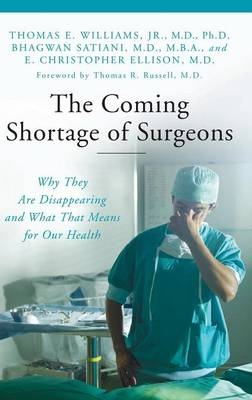
The Coming Shortage of Surgeons
Why They Are Disappearing and What That Means for Our Health
Seiten
2009
Praeger Publishers Inc (Verlag)
978-0-313-38070-9 (ISBN)
Praeger Publishers Inc (Verlag)
978-0-313-38070-9 (ISBN)
A critical, quantitative look at the future supply and demand of surgical specialists that may foretell rationing of surgical services.
The Coming Shortage of Surgeons: Why They Are Disappearing and What That Means for Our Health is the only quantitative analysis of the workforce in orthopedic and thoracic surgery, otolaryngology, obstetrics and gynecology, general surgery, neurosurgery, and urology. It analyzes the demand and supply for these surgeons and gives the causes and remedies for these shortages.
The Coming Shortage of Surgeons quantifies the demand for the surgical workforce, then examines the constraints to supply, which include soaring tuition and medical students’ debts, the demand for a controllable or scheduled lifestyle, malpractice premium expenses, early retirement, and perhaps the most difficult hurdle to overcome: the provision in the Balanced Budget Act of 1997 that caps all medical and surgical residencies at 1996 levels.
Presents the theories of three academic experts objectively analyzing a significant public health issue
Offers an extensive bibliography culled from medicine, health policy experts, think tanks, governmental institutions, and economists to educate the reader in all aspects of this complicated but important topic
The Coming Shortage of Surgeons: Why They Are Disappearing and What That Means for Our Health is the only quantitative analysis of the workforce in orthopedic and thoracic surgery, otolaryngology, obstetrics and gynecology, general surgery, neurosurgery, and urology. It analyzes the demand and supply for these surgeons and gives the causes and remedies for these shortages.
The Coming Shortage of Surgeons quantifies the demand for the surgical workforce, then examines the constraints to supply, which include soaring tuition and medical students’ debts, the demand for a controllable or scheduled lifestyle, malpractice premium expenses, early retirement, and perhaps the most difficult hurdle to overcome: the provision in the Balanced Budget Act of 1997 that caps all medical and surgical residencies at 1996 levels.
Presents the theories of three academic experts objectively analyzing a significant public health issue
Offers an extensive bibliography culled from medicine, health policy experts, think tanks, governmental institutions, and economists to educate the reader in all aspects of this complicated but important topic
Thomas E. Williams, Jr., MD, PhD, is clinical associate professor of surgery in the division of cardio-thoracic surgery at Ohio State University. Bhagwan Satiani, MD, MBA, is professor of clinical surgery in the division of vascular diseases and surgery at Ohio State University. E. Christopher Ellison, MD, is currently the Robert M. Zollinger Professor of Surgery and Chairman of the Department of Surgery at Ohio State University and also serves as the associate vice president for health sciences and vice dean of clinical affairs of the College of Medicine.
| Erscheint lt. Verlag | 15.9.2009 |
|---|---|
| Sprache | englisch |
| Themenwelt | Sachbuch/Ratgeber ► Gesundheit / Leben / Psychologie |
| Medizin / Pharmazie | |
| Technik | |
| ISBN-10 | 0-313-38070-8 / 0313380708 |
| ISBN-13 | 978-0-313-38070-9 / 9780313380709 |
| Zustand | Neuware |
| Haben Sie eine Frage zum Produkt? |
Mehr entdecken
aus dem Bereich
aus dem Bereich
Umgang mit chronischer Müdigkeit und Erschöpfung
Buch | Softcover (2023)
Schulz-Kirchner (Verlag)
13,50 €
für naturheilkundliche, physiotherapeutische und ästhetische …
Buch | Softcover (2024)
Urban & Fischer in Elsevier (Verlag)
40,00 €
selbstbewusst für den eigenen Körper entscheiden : Sex, Zyklus, …
Buch | Hardcover (2024)
Insel Verlag
30,00 €


